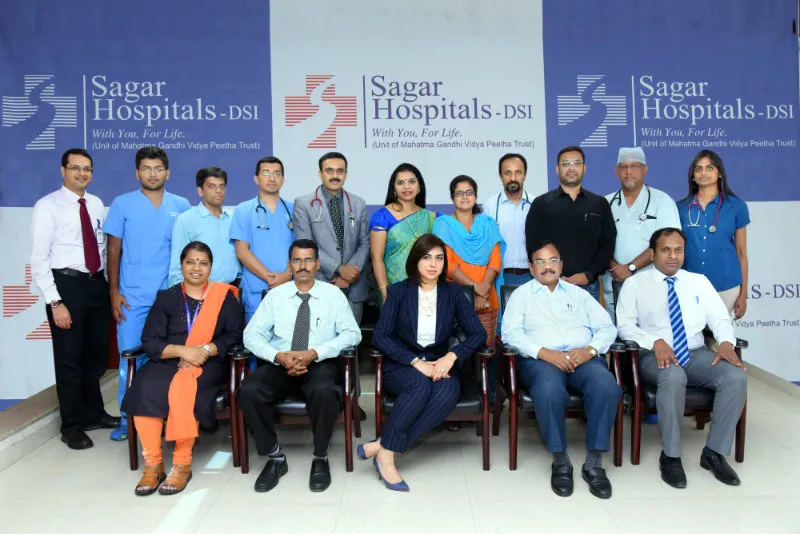'We see few women in leadership positions in healthcare': Ishiqa Multani of Sagar Hospitals
Sagar Hospitals is a family-owned, independent private tertiary care chain and also runs a chain of clinics and pharmacies in Bengaluru.
As the first non-owner and non-medico Executive Vice President at Sagar Hospitals, Ishiqa Multani firmly believes there are opportunities for women leaders and entrepreneurs to create a formidable ecosystem in healthcare in India. At Sagar Hospitals, she gauges changing markets and customer behaviour and takes business transformation and transition decisions.
In a chat with SMBStory, Ishiqa Multani recalls her journey in the healthcare sector.
Excerpts from the conversation:
SMBStory: What led you to enter the healthcare industry?
Ishiqa Multani: I come from an upper-middle class and armed forces background. Back in Punjab, working in agriculture and the armed forces is very common. Further, I lived in Jalandhar, which has a huge network of clinics and getting into the healthcare industry is popular.
I constantly heard stories about my father, who was an army man. He hailed from a small village, owned just two pairs of clothes and cycled for hours every day between home and college. These tales inspired me to be stronger and do better, but job security was not on my mind since I had known being independent from an early age.
Thus, despite having a keen interest in science and facing huge pressures to get into medicine, I took the route of entrepreneurship. I felt I had a knack for doing business. I ran a creative agency for 10 years, right from my university days.
Hence, choosing finance and strategy was a conscious choice. I also got a degree in Finance and Management from The University of Exeter. Applying all of this acquired knowledge of finance to science correlated with the healthcare industry opening up with larger opportunities right here in India.

Ishiqa Multani with members of her medical team at Sagar Hospitals
SMBS: What is your role at Sagar Hospitals?
IM: I was able to translate my finance and strategy background into relevant skills in healthcare. Over the last five years as the Vice President, Strategy and Innovation, I have worked to develop functional strategies, which align with business unit strategies, process innovation, customer experience strategy, relationship building, overseeing events and building the brand.
Now, as the Executive Vice President, in addition to taking business transformation and transition decisions, my role brings with it the responsibility to consolidate and augment current medical services by focusing on creating Centre of Excellences across varied specialities with a focus on clinical excellence, research and development and innovation.
SMBS: Healthcare is a competitive industry. What challenges do you face?
IM: A challenge we continuously face is keeping ourselves aware of the changing needs of our patient base.
Initially, Bengaluru needed a larger corporate healthcare infrastructure to serve its population of 10 million plus. Thus, we didn’t face business dilution or talent loss in spite of competition.
Now, we anticipate more players coming in. The industry is becoming more organised by the day, and is proving to be better and cost-effective for the customer.
SMBS: With the industry landscape changing, how are women represented in healthcare?
IM: It is interesting to note that an overwhelming majority of healthcare workforce is women, but they are under-represented at leadership positions. In the Indian healthcare industry, we see very few women taking up leadership positions and spearheading businesses.
Now, the industry is opening up and there are more opportunities in such positions. Women from other fields such as manufacturing, telecommunications and human resources can also enter healthcare and make a difference.
Being in the era of increased self-awareness and information, women need to understand what the industry has to offer them. Further, women who want to become entrepreneurs in the ecosystem should supplement their passion with guidance from a qualified industry expert. In terms of leveraging digital skills, there are several courses available online that can help in upskilling.
Looking at it positively, there aren’t any barriers.
SMBS: Do you think men have a role to play in boosting women’s representation?
IM: In terms of gender, I don’t see a difference because business is business. It’s all about how much you can contribute irrespective of gender. The key to success is being broad-minded, open to ideas and open to working shoulder-to-shoulder with a diverse set of people.
This has already happened and is gaining momentum not just in healthcare but in several other industries as well.
Sagar Hospitals was co-founded by R Dayananda Sagar and his wife Chandramma Sagar and the first hospital was launched in Jayanagar, Bengaluru in 2002. The second hospital, located in Banashankari, Bengaluru, was launched six years later.







